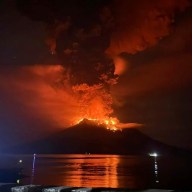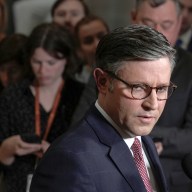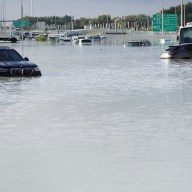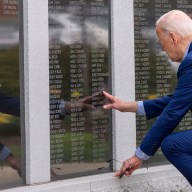By Steve Gorman
LOS ANGELES (Reuters) – Organized labor activists led May Day rallies in several U.S. cities on Tuesday, though in smaller numbers than last year, decrying President Donald Trump’s immigration crackdown as an assault on vulnerable workers in some of America’s lowest-paying jobs.
The biggest gathering was in Los Angeles, where a boisterous but peaceful crowd of several hundred marched through downtown, carrying pro-union and pro-immigration banners while chanting, “Union power” and “This is what democracy looks like.”
In New York City, several hundred May Day activists marched up Broadway to Wall Street while police in Seattle arrested a man suspected of throwing a rock during a rally there.
Organizers sought to combine traditional May Day themes of protecting workers’ rights with a denunciation of Trump’s efforts to increase deportations and a call for voters to show up at the polls for the upcoming mid-term congressional elections.
Protesters also took aim at Trump administration policies and rhetoric they viewed as hostile to the environment, racial and ethnic minorities, women and to members of the lesbian, gay, bisexual and transgender community.
Many railed at the administration’s decision to end temporary protected status for thousands of immigrants from several countries hurt by natural disasters or conflict, including Nicaragua, Haiti, El Salvador, Sudan and Nepal.
They also cited the uncertain status of an estimated 700,000 young immigrants brought to the United States illegally as children and now facing possible deportation after Trump moved to scrap an Obama-era program protecting them.
Rally leaders sought to emphasize that such policies fell especially hard on undocumented workers toiling in low-wage, non-unionized sectors such as fast-food, hospitality, child care and agriculture.
The marches in the United States capped a day of protests elsewhere in the world. In Paris, hundreds of masked and hooded anarchists smashed shop windows, torched cars and hurled cobblestones at riot police on Tuesday, hijacking a May Day rally by labor unions against President Emmanuel Macron’s economic reforms.
FESTIVE AND DEFIANT
Tuesday’s Los Angeles turnout under cloudy skies and a slight drizzle was considerably diminished from the thousands who took to the streets of America’s second-largest city in 2017, for the first May Day celebration after Trump took office.
But the mood was festive and defiant, nevertheless.
“No rain, no clouds, no hate, no division is going to keep workers from celebrating with immigrants, with refugees … with the LGBT community, with the criminal justice reform community, with the environmental justice community,” union leader Laphonza Butler told the crowd, speaking from a flat-bed truck.
Butler heads the Service Employees International Union (SEIU) Local 2015, representing some 380,000 long-term healthcare workers statewide, one of the largest collective bargaining units in the nation.
But marchers represented a broad cross-section of organized labor and other constituencies, from the Teamsters union and nurses to street vendors and a group called the Clean Carwash Campaign.
“May First is a celebration of workers, and a lot of workers in this city are immigrants,” said Karla Cativo, 36, a community organizer with the Salvadoran American Leadership and Educational Fund, which provides services to Central American immigrants.
Cativo, a Salvadoran native who entered the United States as an undocumented immigrant, said she gained U.S. citizenship with “a lot of work and because of a lot of people fighting for my rights.”
Fellow protester Fabian Barcenas, 55, said he wanted to give voice to “millions of workers who pay taxes and support their families who don’t have the chance of having legal status here.”
(Reporting by Steve Gorman in Los Angeles; Additional reporting by Jonathan Allen in New York, John Herskovitz in Austin, Texas, and Omar Younis in Los Angeles; Editing by Lisa Shumaker)
















